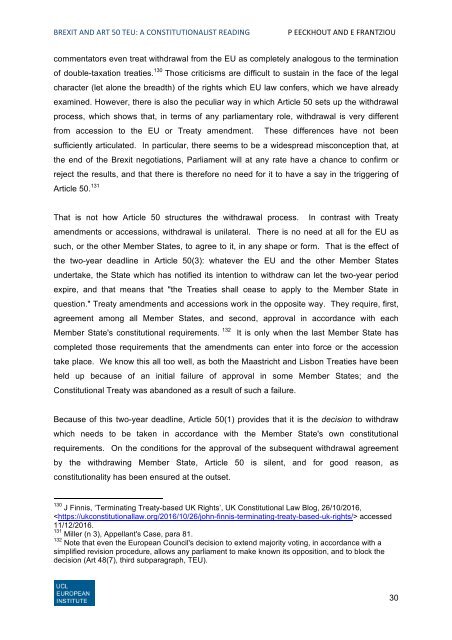brexit-article-50
brexit-article-50
brexit-article-50
You also want an ePaper? Increase the reach of your titles
YUMPU automatically turns print PDFs into web optimized ePapers that Google loves.
BREXIT'AND'ART'<strong>50</strong>'TEU:'A'CONSTITUTIONALIST'READING''''''''''''''''''''P'EECKHOUT'AND'E'FRANTZIOU'<br />
commentators even treat withdrawal from the EU as completely analogous to the termination<br />
of double-taxation treaties. 130 Those criticisms are difficult to sustain in the face of the legal<br />
character (let alone the breadth) of the rights which EU law confers, which we have already<br />
examined. However, there is also the peculiar way in which Article <strong>50</strong> sets up the withdrawal<br />
process, which shows that, in terms of any parliamentary role, withdrawal is very different<br />
from accession to the EU or Treaty amendment. These differences have not been<br />
sufficiently articulated. In particular, there seems to be a widespread misconception that, at<br />
the end of the Brexit negotiations, Parliament will at any rate have a chance to confirm or<br />
reject the results, and that there is therefore no need for it to have a say in the triggering of<br />
Article <strong>50</strong>. 131<br />
That is not how Article <strong>50</strong> structures the withdrawal process. In contrast with Treaty<br />
amendments or accessions, withdrawal is unilateral. There is no need at all for the EU as<br />
such, or the other Member States, to agree to it, in any shape or form. That is the effect of<br />
the two-year deadline in Article <strong>50</strong>(3): whatever the EU and the other Member States<br />
undertake, the State which has notified its intention to withdraw can let the two-year period<br />
expire, and that means that "the Treaties shall cease to apply to the Member State in<br />
question." Treaty amendments and accessions work in the opposite way. They require, first,<br />
agreement among all Member States, and second, approval in accordance with each<br />
Member State's constitutional requirements. 132 It is only when the last Member State has<br />
completed those requirements that the amendments can enter into force or the accession<br />
take place. We know this all too well, as both the Maastricht and Lisbon Treaties have been<br />
held up because of an initial failure of approval in some Member States; and the<br />
Constitutional Treaty was abandoned as a result of such a failure.<br />
Because of this two-year deadline, Article <strong>50</strong>(1) provides that it is the decision to withdraw<br />
which needs to be taken in accordance with the Member State's own constitutional<br />
requirements. On the conditions for the approval of the subsequent withdrawal agreement<br />
by the withdrawing Member State, Article <strong>50</strong> is silent, and for good reason, as<br />
constitutionality has been ensured at the outset.<br />
130 J Finnis, ‘Terminating Treaty-based UK Rights’, UK Constitutional Law Blog, 26/10/2016,<br />
accessed<br />
11/12/2016.<br />
131 Miller (n 3), Appellant's Case, para 81.<br />
132 Note that even the European Council's decision to extend majority voting, in accordance with a<br />
simplified revision procedure, allows any parliament to make known its opposition, and to block the<br />
decision (Art 48(7), third subparagraph, TEU).<br />
30


